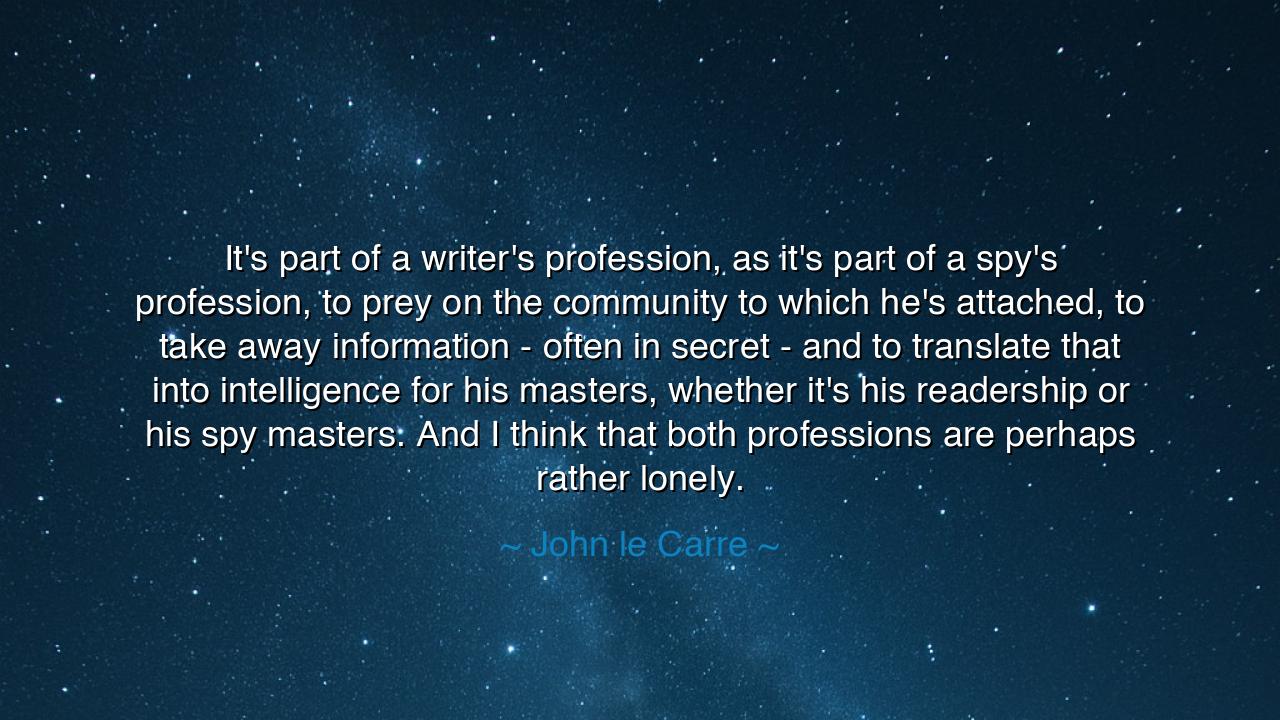
It's part of a writer's profession, as it's part of a spy's
It's part of a writer's profession, as it's part of a spy's profession, to prey on the community to which he's attached, to take away information - often in secret - and to translate that into intelligence for his masters, whether it's his readership or his spy masters. And I think that both professions are perhaps rather lonely.






The words of John le Carré, the master of shadows and secrets, flow with both sorrow and understanding: “It’s part of a writer’s profession, as it’s part of a spy’s profession, to prey on the community to which he’s attached, to take away information — often in secret — and to translate that into intelligence for his masters, whether it’s his readership or his spy masters. And I think that both professions are perhaps rather lonely.” In these lines lies the confession of a man who has lived in two worlds — one of fiction and one of espionage — and who saw, more clearly than most, the hidden cost of knowledge. He speaks of two kinds of watchers: the writer and the spy, both seekers of truth, both condemned to live on the edge of belonging, forever observing what others live and feel.
In the ancient manner of wisdom, le Carré reminds us that every seeker of truth must sometimes walk apart. The writer, like the spy, moves unseen through the crowd, not to harm it, but to understand it — to gather fragments of humanity and weave them into meaning. Yet in doing so, he becomes an outsider. To “prey on the community,” as le Carré says, is not to exploit it, but to study it, to take what is hidden and make it visible. The writer listens to whispers others ignore; he sees betrayal where others see laughter; he draws from the secret heart of the world and turns it into intelligence — not for kings or generals, but for the reader who seeks to understand life itself.
So too is the path of the spy, who lives between masks, harvesting truths in silence. The spy’s duty is not to judge, but to know. He gathers secrets to protect the realm, though in doing so, he may lose his place within it. The world of espionage and the world of art are mirrors of one another — both demand observation without belonging, both require sacrifice. Le Carré, who lived as both an intelligence officer and a novelist, knew the taste of this duality. His words are not theory but testimony: that in every act of seeking truth, one risks isolation, for those who see too deeply often find themselves standing alone.
Consider the tale of Thucydides, the ancient Greek historian who chronicled the Peloponnesian War. Banished from his homeland for failure in command, he used his exile to watch from afar, recording the movements of nations and the follies of men. Like le Carré, Thucydides transformed secret knowledge into enduring intelligence. He observed, analyzed, and preserved truth, though it cost him his belonging. He, too, “preyed” upon his community — not out of malice, but from the duty to reveal the inner workings of power and human ambition. And in his solitude, he gave the world a masterpiece that outlasted every empire he described.
The loneliness of which le Carré speaks is the loneliness of all who seek truth in the shadows. The writer listens deeply, yet cannot fully share what he hears; the spy knows much, but must pretend to know nothing. Both serve unseen masters — one serves the readership, the other the state — and both transform raw experience into revelation. Yet in their quiet service, they are estranged from the warmth of the ordinary world. To see everything is to lose the comfort of ignorance; to understand others too well is to forever stand apart.
But there is a quiet nobility in this loneliness. For the writer and the spy alike, solitude is not a curse but a crucible — the place where truth is refined. To carry secrets is to bear a burden few can share. And yet, through their isolation, such souls offer light to others. The writer, in revealing what is hidden, frees others from illusion; the spy, in protecting what is fragile, preserves peace unseen. Both move through the shadows so that others may live in the sun.
Thus, the lesson of John le Carré’s words is clear: those who seek understanding must be prepared to walk alone. To know deeply is to stand apart. But let that solitude not harden the heart — let it instead sharpen perception, deepen compassion, and strengthen purpose. Whether one writes or serves, the calling is the same: to turn hidden truths into wisdom that others may live by. And though the path may be lonely, it is through such wanderers of the in-between — the spies of nations and the spies of the soul — that humanity comes to know itself.
So, dear listener, if you are one who watches, who writes, who observes life’s secret motions, do not fear the silence. It is the silence of understanding. Be faithful to it. For though the world may not see your labor, your work — like le Carré’s own — will whisper truth through the ages, a testament that even in loneliness, one may serve the highest master of all: truth itself.






AAdministratorAdministrator
Welcome, honored guests. Please leave a comment, we will respond soon